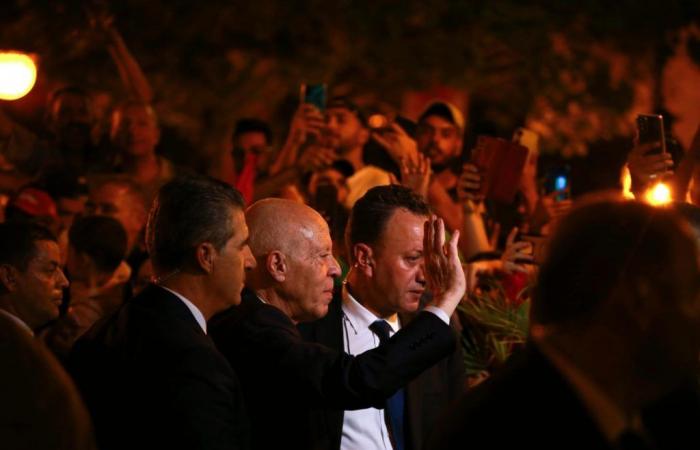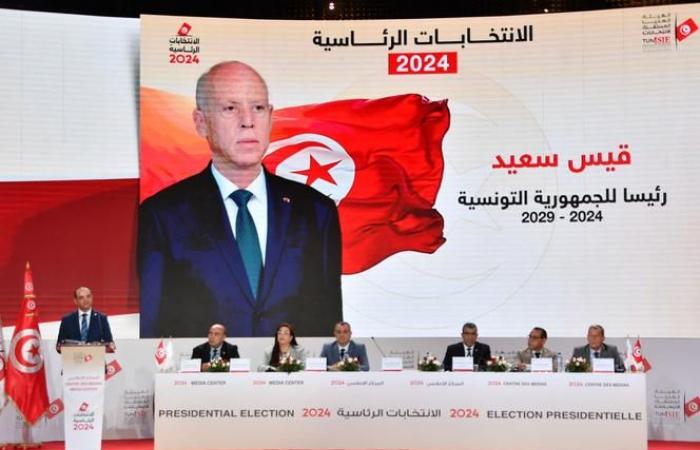Outgoing President Kais Saied, accused by civil society of “authoritarian drift”was re-elected by an overwhelming majority of 90.7% in Tunisia, during a vote on Sunday “locked” in advance and marked by a record abstention.
Mr. Saied obtained the votes of just over 2.4 million voters out of 9.7 million registered, the Independent High Authority for Elections (ISIE) announced on Monday. The participation rate stood at 28.8%, the lowest since the advent of democracy in 2011 in the North African country of 12 million inhabitants, cradle of the Arab Spring, after the overthrow of the dictator Ben Ali.
The vote was “locked” for a victory “hands down” from Mr. Saied, predicted expert Michaël Ayari of the International Crisis Group. Only two competitors – second knives – were allowed to present themselves out of seventeen initially, after the elimination of Mr. Saied’s strongest rivals.
Ayachi Zammel, a liberal industrialist, 47, received only 7.35% of the vote, and Zouhair Maghzaoui, a former member of the pan-Arab left, obtained only 1.97%.
Read also | Article reserved for our subscribers Presidential election in Tunisia: Kaïs Saïed, from the promise of probity to the locked regime
Add to your selections
“Distorted” process
M. Saied, 66 ans, “retains its electoral base”Tunisian analyst Hatem Nafti told Agence France-Presse (AFP), even if he lost more than 300,000 votes compared to 2019, when this constitutional law teacher, new to politics, became president to everyone’s surprise with 73% of the votes and a participation of 58%.
After the broadcast on Sunday evening of estimates giving him largely victorious, several hundred of his supporters came down to cheer him on the main avenue of Tunis, with horns and patriotic songs. But young people who were very mobilized five years ago deserted the polls, with 6% of voters in the age group between 18 and 35, according to figures given on Sunday by the ISIE, compared to a participation of 65%. among 36-60 year olds. “The legitimacy of the election is tainted”estimated Mr. Nafti, stressing that “candidates who could overshadow Mr. Saied were systematically excluded”.
Read also | Article reserved for our subscribers Presidential election in Tunisia: opponents still in the running, despite pressure from those in power
Add to your selections
The submission of candidacies was akin to an obstacle course with a high number of sponsorships required, the imprisonment of known potential candidates, and the ousting by the ISIE of competitors truly dangerous for Mr. Saied. Tunisian and foreign NGOs denounced an electoral authority “having lost his independence” and a process “skewed in favor of Mr. Saied”.
The European Union said it had “took note” criticisms from different NGOs and opponents “concerning the integrity of the electoral process” et “various measures deemed prejudicial to the democratic requirements of credibility” of the ballot.
Read also | In Tunisia, a demonstration against Kaïs Saïed and a “masquerade” presidential election
Add to your selections
“Authoritarian drift”
Mr. Zammel has not been able to campaign because he has been imprisoned since the beginning of September and has already been sentenced three times to more than fourteen years in prison for alleged sponsorship falsification. Mr. Maghzaoui, aligned with the sovereignist ideology of Mr. Saied, was penalized by his support for the president’s coup in July 2021 when he seized full powers to, he said, restore the order.
Follow us on WhatsApp
Stay informed
Receive the essential African news on WhatsApp with the “Monde Afrique” channel
Join
The operation was widely applauded by a population tired of parliamentary bickering and economic difficulties, of which Mr. Saied accused the “corrupt politicians” financed by “foreign powers”having dominated the decade of democracy, mainly targeting the Islamo-conservative movement Ennahdha.
Read also | Article reserved for our subscribers Presidential election in Tunisia: Kaïs Saïed, the gravedigger of Ennahda
Add to your selections
But instead of reviving growth to combat endemic unemployment which is fueling emigration flows towards Europe, the president has devoted his energy, according to the opposition and NGOs, to repressing civil society in a “authoritarian drift”.
Since the spring of 2023, more than twenty opponents, including the leader of Ennahdha, Rached Ghannouchi, and the nostalgic passionnaria of the Ben Ali era, Abir Moussi, have been imprisoned. In recent months, trade unionists, lawyers, political columnists and defenders of migrant rights have also found themselves in prison.
Hatem Nafti fears a further hardening of power after “the coronation of Mr. Saied” who took up his favorite slogans on Sunday, announcing in a martial tone, wanting “continue the 2011 Revolution” to build “a country cleansed of corrupt people and conspiracies”.
Read also | The endless illiberal regression of Tunisia
Add to your selections







